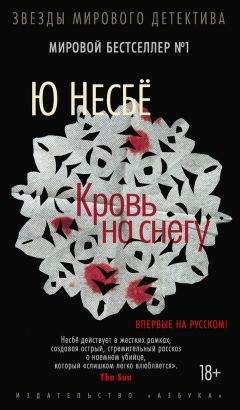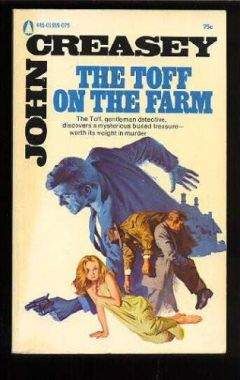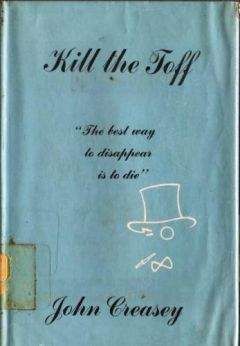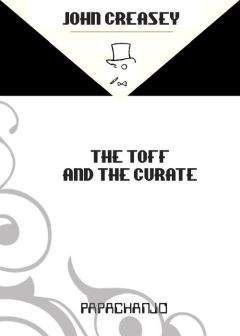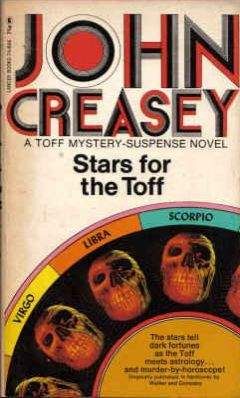John Creasey - The Toff and The Lady
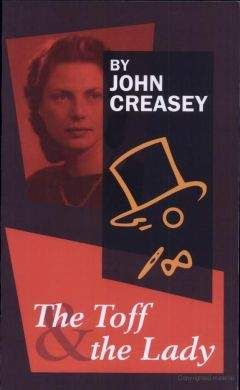
Обзор книги John Creasey - The Toff and The Lady
JOHN CREASEY
The Toff and The Lady
Copyright Note
This e-book was created by papachanjo, with the purpose of providing a digitized format of the books written by John Creasey without the least intention of commercial gain of any sort. This e-book should hence be utilized for reading only and if you like it and can buy it, please do to support the publishers.
I am trying to create at least an ample collection of all the John Creasey books which are in the excess of 500 novels. Having read and possess just a meager 10 of his books does not qualify me to be a fan but the 10 I read were enough for me to rake up some effort to scan and create these e-books.
If you happen to have any John Creasey book and would like to add to the free online collection which I’m hoping to bring together, you can do the following:
Scan the book in greyscale
Save as djvu - use the free DJVU SOLO software to compress the images
Send it to my e-mail: [email protected]
I’ll do the rest and will add a note of credit in the finished document.
from back cover
The letter was simply addressed to “The Toff, London W1.” Inside it was a photograph of a lovely woman. The lady herself had arrived at a society ball the previous night, looking deadly pale in black satin and mink. She said she had lost her memory and nobody knew who she was. Within days, murder and intrigue had followed her.
Table of Contents
Copyright Note
Chapter One
Chapter Two
Chapter Three
Chapter Four
Chapter Five
Chapter Six
Chapter Seven
Chapter Eight
Chapter Nine
Chapter Ten
Chapter Eleven
Chapter Twelve
Chapter Thirteen
Chapter Fourteen
Chapter Fifteen
Chapter Sixteen
Chapter Seventeen
Chapter Eighteen
Chapter Nineteen
Chapter Twenty
Chapter Twenty-One
CHAPTER ONE
MR. ROLLISON READS THE POST
FEW things gave Richard Rollison more pleasure than reading the post and the newspapers while having his morning tea. In far-off days it had been a ritual. Jolly, his man, who could make ritual out of scrambling an egg, would wait until he heard the first sound of movement inside the bedroom; then, as if by magic, he would appear with freshly made tea, the letters and the newspapers, neatly folded, on a large ornamental tray which Rollison said had a baroque quality more suitable to one of the more ornate hotels. It was a present from an Aunt. Nowadays the post arrived later and Rollison rose earlier than of yore; consequently it was seldom that he could indulge himself.
One September morning, however, when the skies were overcast and the heavens opened to send a deluge over London, was to be properly celebrated if the post arrived before Rollison woke up. Jolly went to the window several times to see what progress the postman was making, returning each time with the frown on his lined face a little deeper. When Jolly’s face was in repose most people thought him a gloomy fellow, and when he frowned he was like an apostle of gloom.
On the kitchen table the tray stood ready, glittering beneath the electric light; on the stove the electric kettle was singing, and by the tray were the newspapers. Jolly looked at them as if to make sure that no intruder had disarranged them, and then stepped towards the bedroom door. There was silence. His frown cleared a little. He stepped to the window and, after a moment, he looked radiant. From the house next door there came a rat-tat-tat, and then the postman appeared.
“I do hope,” murmured Jolly, who occasionally confided aloud in himself when he was alone, “that we have a cheerful post.”
He was doubtless thinking of the fact that on the previous night—or rather, in the early hours of that morning—Rollison had been in low spirits. The weather just now would be enough to depress a saint, and Jolly’s only hope of a brightening prospect was vested in the post. True, the chances were against such a fillip, but it was not surprising that a man who had worked for many years for the Hon. Richard Rollison believed in miracles.
The front door bell rang.
Jolly hurried to answer it, greeted the postman courteously, and was given a large bundle of letters and one packet which he did not examine. In fact he forewent his usual scrutiny of the post, for there came a summons from Rollison’s room.
“Jolly!”
“One moment, sir,” called Jolly.
He hurried into die kitchen, put the letters with the newspapers, wetted the tea, whisked the tray from the table and, in less than sixty seconds, opened the bedroom door.
“Good morning, sir.” He stepped towards the bedside table. “Your tea, sir. Your post. Your newspapers.”
“Ah,” said Rollison, his grey eyes kindling. He was lean and dark, with a thin dark moustache, and some people said that he was too good-looking and too conscious of his looks. “That helps. What do you think of the weather, Jolly?”
“Most unseasonal, sir, but it may clear before noon,” said Jolly, serenely, “I have often noticed, too, that when we have a wet September, October is usually a glorious month and November is almost spring-like. Would you like the fire switched on?”
“No,” said Rollison.
Jolly handed him the letters, including the package, and poured out tea. Rollison sat up in royal blue pyjamas decorated with silk lilies, his dark hair standing on end and his tanned face strikingly handsome. He switched on the lamp which was fitted to the wall above his head.
Your tea, sir,” said Jolly.
“Thanks.” Rollison took the cup, and picked up the letters one by one. “A bill, Jolly. A letter from Aunt Matilda. A letter from Alec Gregory—he probably wants me to go down on the farm for a few weeks.” He sipped his tea, continuing to turn the letters over. “Bill—receipt—bill—a letter from a man or woman who calls me Rawlison, posted in the East End—that might be interesting. Open it, Jolly.”
“Very good, sir.” Jolly used the paper-knife from the tray, and took out the letter as Rollison continued to murmur about the others. There were begging letters, appeals from charities, circulars, a selection of letters from relatives—in fact a surprising number. Rollison reached a bill which he thought was the last of the small letters, finished his tea, and looked up.
“Well. Jolly?”
“It is from Mrs. Link, sir, who hopes that you will go to supper to-night.” Jolly showed that he disapproved of the suggestion.
“Curious,” said Rollison. “She usually only invites me on great occasions. It isn’t my birthday, is it?”
“No, sir, that is in the Spring.”
“It looks as if the family is getting its happy returns in early,” said Rollison, “I haven’t known such a number of tender inquiries for a long time.”
He was holding out his cup for replenishment, and relinquished his hold too soon, so that only Jolly’s swift movement averted a minor disaster. “Jolly!”
Yes, sir,” said Jolly.
“Look at that!”
He was staring at the large envelope, and Jolly looked down, seeing the address for the first time. There was nothing really remarkable about it as far as Rollison was concerned, except that it had come through the post and been safely delivered.
“How very remarkable, sir,” said Jolly.
“That’s putting it mildly,” said Rollison, and peered at the postmark. “London, W.C.1, 6.15 p.m. yesterday. Jolly, we are famous!”
“It is really most gratifying,” murmured Jolly.
The typewritten address was:
The Toff,
London, W.l.
Many letters had been addressed to “The Toff, Gresham Terrace”, but never one as briefly as this. Rollison considered it curiously as Jolly handed him the paper-knife.
The envelope was a stout one, tightly packed. The contents would not come out when the top was slit, and so he slit one side and took out two pieces of thin cardboard, fastened together with gummed tape—the cardboard was almost the same size as the envelope. He cut the tape and took the pieces apart. There, face downwards, was what appeared to be a cabinet-size photograph.
Rollison looked up at Jolly.
“This looks like a family joke,” he said, “of the kind that would seem funny to one of my less responsible relatives. Or” —he grinned— “it might be from Lady Matilda. I sent her some rouge, lipstick and powder for her seventeenth birthday, and I knew she would revenge herself sooner or later.”
“Supposing you looked at the other side, sir,” suggested Jolly.
“I’m in the mood for a guessing game. My first is Lady Matilda. What’s yours?”
“If you insist, sir, I would say that it is perhaps a photograph of some film star, who chooses such a method of advertisement.”
“What! With no photographer’s studio emblazoned on the back? Never! As a matter of fact it looks like a newspaper print.” Rollison turned it slowly, and Jolly leaned forward to get a better view.
Neither of them made any comment.
It was the portrait of a woman. Rollison, studying it carefully, judged her to be in the early thirties. She was not beautiful by any accepted standard, but there was a quality about her which might loosely be termed “lovely”. The photograph itself was perfect. The woman seemed to be there in the flesh, looking up at him with narrowed, slightly oblique eyes under long, curved lashes. Her face was rather broad and her cheekbones a shade higher than those of most English women. Her mouth, wide and full, curved a little at the corners, as if she knew this was a joke and was getting great enjoyment from it. About her neck was a rope of pearls, three strings, close-fitting like a collar. The sweep of her neck into her shoulders was loveliness itself.
After a long pause, Rollison said:
“Well, well!” He looked up at Jolly. “No, it’s not a secret passion. She is a stranger to me as well.”
“Really, sir?”
“Oh indubitably.” Rollison held the photograph up, to get a better light on it.
“How would you describe her?”
“I do not feel qualified to say, sir.”
“You’re very non-committal this morning,” said Rollison. “I wonder if there’s a letter with it.”
There was no letter, no compliments slip, nothing except the postmark on the envelope to give any clue as to the source of the photograph. Either Jolly’s interest waned or he thought it time he began to cook breakfast, for he went out, leaving the tray. Rollison put the photograph on one side, but glanced at it each time he picked up a letter. Most of those from his relatives were casual enough; Lady Matilda Wirrington demanded to know, in colourful terms, whether he had sent her a package intended for some wench who was not satisfied with the face which nature had given her, and added a note that if he ever expected a gift from her he would be dis-appointed. In a postscript, which seemed a little wistful, she had added: “When are you coming to see me, Richard?” The bills and circulars were uninteresting, there were two begging letters and the note from Alec Gregory who wanted him to spend a week at his farm in Hampshire.
“I might even do that,” mused Rollison.
Jolly came to tell him that his bath was ready. He had not had time to open the papers, and he decided to look at the headlines while he was having breakfast. He got out of bed and stretched, nearly touching the ceiling with his fingers, for he was over six-foot. As he put on his dressing-gown, however, the tassel of the cord caught in the ornamental handle of the tray. He just saved the whole contents from falling, but knocked the newspapers to the floor. Absently, he picked them up. When bending down he caught another glimpse of the photograph, which intrigued him greatly. Anonymous letters were not rare, but an anonymous photograph had never come his way before.
Then he saw the front page of The Record.
A picture caught his eye, and slowly he raised the newspaper, for he saw that the picture was a likeness of the woman whose photograph lay on the bed. It was not a reproduction from the photograph; the angle was slightly different and the woman was not wearing her pearls, but undoubtedly it was the same woman. The difference between the pictures seemed more marked the longer he studied the newspaper. Gone were the curves at the corners of the lips and the suggestion of veiled mockery in the narrowed eyes. The photograph showed something of the character of the woman, the picture in The Record had a blankness of expression which disturbed him. She looked lost and forlorn.
In heavy type above the picture were the words: DO YOU KNOW THIS WOMAN? Beneath it, in italics: To read the amazing story turn to page 3, column 1.
Slowly, Rollison turned to page 3.
CHAPTER TWO
THE STORY OF THE LADY
“HALLO, Rolly,” said Superintendent Grice, “I thought you had gone north after some bad men.” He shook hands with Rollison and pulled up an armchair covered in faded green cloth, then offered cigarettes. “Couldn’t you find them?”
“They were non-existent,” Rollison said, sinking into the chair. “Thanks. You look very spruce this morning. Everyone seems to be celebrating something.”
Grice was, indeed, immaculately dressed. In his buttonhole was a white carnation, he wore a wing collar and a bow tie, and in place of his usual lounge suit which always looked in need of pressing, he had on morning dress. Scotland Yard had never seen him so well turned out. Nothing, however, could alter his rather severe, even aquiline features across which the skin was stretched tightly, showing the little parallel ridges at the bridge of his nose. His skin seemed to glow; it was a golden brown, more often seen in Italians and Spaniards than in Englishmen. Brown hair and brown eyes with that delicate skin made him look almost un-English.
“One of the Inspectors is getting married at noon,” he said, “hence the fal-de-rols.”
“Do I know him?” asked Rollison.
“I doubt it. Charters, who’s just been promoted—he was in the Records Office.”
“I seem to have heard of him vaguely,” said Rollison. “I’ve been out of touch for too long. Occasional descents on to the sanctum sanctorum aren’t enough.” He smiled. “I’ll have to put it right. You’ll soon find me at your elbow wherever you go, always ready with a word of advice. How does it appeal?”
“It sounds terrible,” said Grice.
Between these two men there was a friendship the stronger because when they had first met it had been in an atmosphere of mutual suspicion, not far removed on Grice’s side from hostility. That was in the days when Rollison, so widely known as The Toff, had taken on himself the investigation of crimes, with scant regard for police susceptibilities. The Toff had matured since then and the police even consulted him occasionally, although some officers at Scotland Yard could not forgive his early wilfulness. Grice knew his worth, however, and nothing seriously ruffled the calm of their association.
